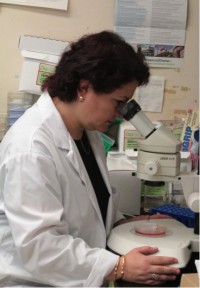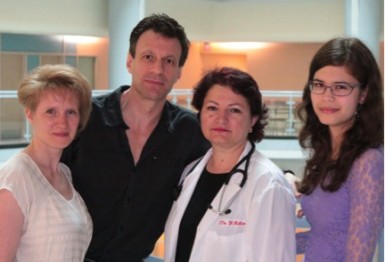Editor’s Note: Dr. Billia is a clinician-scientist and heart failure specialist at the Peter Munk Cardiac Centre and the University Health Network. More details about this research are available via the University Health Network’s website. The research is currently in the pre-clinical, proof-of-concept stage.
Unfortunately, this is the kind of tragedy that can happen: Jason and his new bride were enjoying a dream honeymoon in Hawaii when he started to complain of severe chest pain. Leaving the beach behind, the newlywed went to the hospital and was told the last thing he wanted to hear – he was having a heart attack – again. Although only 34 years young, Jason had suffered two heart attacks already that had left his heart damaged. His honeymoon was definitely over. He needed to have a stent inserted into a closed artery, and to be placed on life support, in order to be transferred back to Toronto. At home he was given a mechanical heart and the new husband now awaits a life saving heart transplant.
WHY?
Currently the heart is not able to “repair” itself effectively. Understanding the regulation of heart cell growth, death and proliferation is key to being able to prevent the development of heart failure, which is affecting Canadians in epidemic proportions.
THE GOOD NEWS
Dr. Phyllis Billia has uncovered an amazing scientific breakthrough through her research at the University Health Network. Until now it has been widely understood that heart cells are unable to regenerate. Dr. Billia has provided the first direct evidence suggesting that there are roadblocks in place that prevent the heart from being able to regenerate. By removing these roadblocks, Dr. Billia’s work has shown that the heart cells do proliferate and may provide a potential avenue for repair.

Most of us know friends or family who suffer with heart disease. In Canada alone, one person dies every seven minutes from heart disease or stroke. An increasing number of patients who survive heart attacks develop chronic problems and face even more complex cardiac conditions that are progressively leading to the epidemic of heart failure.
Imagine the implications with this new discovery! It could be possible to reverse the effects of a heart attack from ever happening and eliminate the symptoms of fatigue, light-headedness, fluid retention, palpitations and a general feeling of unwellness. No longer will patients rely on drug therapy to maintain a poor quality of life due to an ailing heart.
Looking beyond the heart, this remarkable discovery may have the potential to be applied to other organs that do not naturally regenerate, like the brain and pancreas. Therefore the applicability of the research is far-reaching.
And from an economic standpoint, Dr. Billia’s research could help reduce the ever-growing cost of health care. More than $1 billion of Canada’s annual healthcare budget is being spent for the care of patients with heart failure, rendering this disease an ever-increasing socioeconomic burden.
By establishing a research lab for Dr. Billia, she and her colleagues will be able to continue this groundbreaking research, and forever change the approach to a medical condition that affects 50,000 new patients every year.
How could Jason’s story have ended differently if Dr. Billia’s research were to continue? Promising new drugs could reduce the damage from the heart attack and Jason would be able to live a happy, healthy life, without needing a heart transplant to save his life.

More details about this research are available via the University Health Network’s website.

